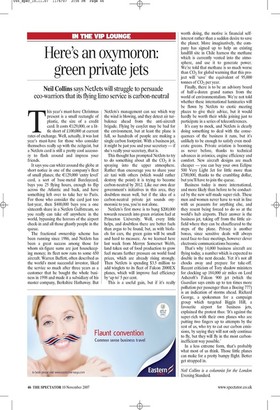Here's an oxymoron: green private jets
Neil Collins says NetJets will struggle to persuade eco-warriors that its flying limo service is carbon-neutral This year's must-have Christmas present is a small rectangle of plastic, the size of a credit card. It costs €129,000, or a little short of £100,000 at current rates of exchange. Well, actually, it was last year's must-have for those who consider themselves really up with the zeitgeist, but a NetJets card is still a pretty cool accessory to flash around and impress your friends.
It says you can whizz around the globe at short notice in one of the company's fleet of small planes; the €129,000 'entry level' card, a sort of base-metal Barclaycard, buys you 25 flying hours, enough to flip across the Atlantic and back, and have something left over to take her to Paris. For those who consider the card just too last-year, then $400,000 buys you a one sixteenth share in a NetJets Gulfstream, so you really can take off anywhere in the world, bypassing the horrors of the airport check-in and all those ghastly people in the queue.
The fractional ownership scheme has been running since 1986, and NetJets has been a great success among those for whom six-figure sums are just housekeeping money; its fleet now runs to some 650 aircraft. Warren Buffett, often described as the world's most successful investor, liked the service so much after three years as a customer that he bought the whole business in 1998 and made it a subsidiary of his master company, Berkshire Hathaway. But Net.Tets's management can see which way the wind is blowing, and they detect air turbulence ahead from the anti-aircraft brigade. Flying by easyJet may be bad for the environment, but at least the plane is full, so hundreds of people are making a single carbon footprint. With a business jet, it might be just you and your secretary — if she's really your secretary, that is.
This thought has prompted NetJets to try to do something about all the CO2 it is spraying into the upper atmosphere. Rather than encourage you to share your air taxi with others (which would rather destroy the point) it is trying to become carbon-neutral by 2012. Like our own dear government's initiatives in this area, they doubtless mean well, but if the idea of a carbon-neutral private jet sounds oxymoronic to you, you're not alone.
Net.Tets's first move is to bung $200,000 towards research into green aviation fuel at Princeton University. Well, every little helps, and doubtless there are better fuels than avgas to be found, but, as with biofuels for cars, the green gains will be small and hard to measure. As we learned here last week from Merryn Somerset Webb, land taken out of food production to grow fuel means further pressure on world food prices, which are already rising strongly. Then NetJets is spending $3.5 million to add winglets to its fleet of Falcon 2000EX planes, which will improve fuel efficiency by 'up to' 5 per cent.
This is a useful gain, but if it's really worth doing, the motive is financial selfinterest rather than a sudden desire to save the planet. More imaginatively, the company has signed up to help an existing landfill site in Chile harness the methane which is currently vented into the atmosphere, and use it to generate power. We're told that methane is so much worse than CO2 for global warming that this project will 'save' the equivalent of 95,000 tonnes of CO2 per year.
Finally, there is to be an advisory board of half-a-dozen grand names from the world of environmentalism. We're not told whether these international luminaries will be flown by NetJets to exotic meeting places to give their advice, but it would hardly be worth their while joining just to participate in a series of teleconferences.
It's easy to mock, and NetJets is clearly doing something to deal with the consequences of the business it runs, but it's unlikely to be enough to satisfy even moderate greens. Private aviation is booming as never before, thanks to technical advances in avionics, engine efficiency and comfort. New aircraft designs are much cheaper — you can buy your own Eclipse 500 Very Light Jet for little more than £700,000, thanks to the crumbling dollar, but you'll have to join the queue.
Business today is more international, and more likely than before to be conducted by the new self-made super-rich. These men and women never have to wait in line with us peasants for anything else, and they resent being forced to do so at the world's hub airports. Their answer is the business jet, taking off from the little airfield where they can be chauffeured to the steps of the plane. Privacy is another bonus, since sensitive deals will always need face-to-face meetings, however clever electronic communications become.
That's why 14,000 business aircraft are flying today, a number which is expected to double in the next decade. Yet it's not all chocks away and prepare for take-off. Recent criticism of Tory shadow ministers for clocking up 184,000 air miles on Lord Ashcroft's Falcon 900 jet (which the Guardian says emits up to ten times more pollution per passenger than a Boeing 777) is an indication of storms ahead. Richard George, a spokesman for a campaign group which targeted Biggin Hill, a favourite airport for business jets, explained the protest thus: 'It's against the super-rich with their own planes who are putting two fingers up to attempts by the rest of us, who try to cut our carbon emissions, by saying they will not only continue to fly, but they will fly in the most carboninefficient way possible.'
In a less extreme form, that's probably what most of us think. Those little planes can make for a pretty bumpy flight. Better get strapped in.





































































 Previous page
Previous page